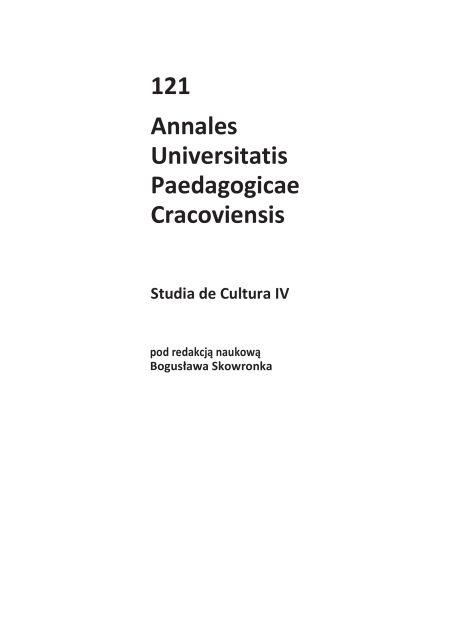Abstract
Scandalous otherness. Child as abject
The paper raises the problem of the child as the Great Other, who appears in the novels of Doris Lessing The Fifth Child and Kenzaburo Öe A personal matter. In both works coming into the world of the Other - a handicapped boy - puts to the test the moral foundations of the conservative society. Nobel Prize winners are making human vivisection that shall specifically examine the persistence of attitudes and values such as parenthood, love, responsibility, confidence in front of drastic Otherness. The child manifests its differences, can not cope in relations with the environment, for which it is something dangerous, threatening ordered hierarchy of the family. Scandal also cause parents responsible for the birth of the ,,monster”. In Doris Lessing novel mother is excommunicated from the patriarchal society, in the prose of Öe father is alone in the community in which he lives with his son. For the analysis of the text the theory of Julia Kristeva on disgust will be used. Categories of abject, semiotic-ness, ,,the stranger in me” will help answer the question - why the hyperactive boy (The Fifth Child) and a boy with cerebral hernia (A personal matter) cause scandal and fear.
References
Badinter E., Fałszywa ścieżka, przeł. M. Kozłowska, Warszawa 2005.
View in Google Scholar
Bereza T., Dwie powieści z Japonii, w: tegoż, Proza z importu. Szkice literackie, Warszawa 1979.
View in Google Scholar
Bereza, Proza z importu. Szkice literackie, Warszawa 1979.
View in Google Scholar
Budrowska B., Macierzyństwo jako punkt zwrotny w życiu kobiety, Wrocław 2000.
View in Google Scholar
Coetzee J. M., Zapiski ze złego roku, przeł. M. Kłobukowski, Kraków 2008.
View in Google Scholar
Humm M., Słownik teorii feminizmu, przeł. B. Umińska i J. Mikos, Warszawa 1993.
View in Google Scholar
Iwasiów I., Gender dla średniozaawansowanych. Wykłady szczecińskie, Warszawa 2004.
View in Google Scholar
Janion M., Romantyzm, rewolucja, marksizm. Colloquia gdańskie, Gdańsk 1972.
View in Google Scholar
Jarniewicz J., Literatura jako uczestnictwo, „Tygodnik Powszechny” 2007, nr 42.
View in Google Scholar
Kitliński T., Obcy jest w nas. Kochać według Julii Kristevej, Kraków 2001.
View in Google Scholar
Kristeva J., Obcość kulturowa i podmiot w kryzysie. Wywiad Suzanne Clark i Kathleen Hulley, przeł. A. Mizińska-Kleczkowska, w: Podmiot w procesie, red. J. Jusiak i J. Mizińska, Lublin 1999.
View in Google Scholar
Kristeva J., Potęga obrzydzenia. Esej o wstręcie, przeł. M. Falski, Kraków 2007.
View in Google Scholar
Lessing D., Piąte dziecko, przeł. A. Gren, Warszawa 2005.
View in Google Scholar
Libera L., Mickiewicz i medycyna. Szkice romantyczne, Zielona Góra 2010.
View in Google Scholar
Melanowicz M., Literatura japońska. Proza XX wieku, Warszawa 1994.
View in Google Scholar
Öe K., Futbol ery Manen, przeł. M. Melanowicz, Warszawa 1979.
View in Google Scholar
Öe K., Sprawa osobista, przeł. Z. Uhrynowska, Warszawa 1974.
View in Google Scholar
Pierzchała A., Zerwać pąki, zabić dzieci, Kenzaburo, Oe, http://wyborcza.pl/1,75517,2283351.html [22.10.2011].
View in Google Scholar
Podmiot w procesie, red. J. Jusiak i J. Mizińska, Lublin 1999.
View in Google Scholar
Rymkiewicz J.M., Myśli różne o ogrodach. Dzieje jednego toposu, Warszawa 1968.
View in Google Scholar
Szczuka K., Milczenie owieczek. Rzecz o aborcji, Warszawa 2004.
View in Google Scholar
Terakowska D., Poczwarka, Kraków 2008.
View in Google Scholar
The Nobel Prize in Literature 1994, Kenzaburo Oe, http://www.nobelprize.org/nobel_prizes/literature/laureates/1994/ [14.10.2011].
View in Google Scholar
The Nobel Prize in Literature 2007, Doris Lessing, http://nobelprize.org/nobel_prizes/literature/laureates/2007/# [14.10.2011].
View in Google Scholar
Tokarczuk: To wielka autorka, „Gazeta Wyborcza” 2007, nr 239.
View in Google Scholar
Zło, które nas zamieszkuje. Rozmowa Louisa-Philippe’a Dalemberta z Julią Kristevą, przeł. B. Maciejewska, „Magazyn Sztuki” 1996, nr 12.
View in Google Scholar

